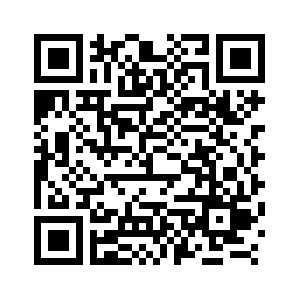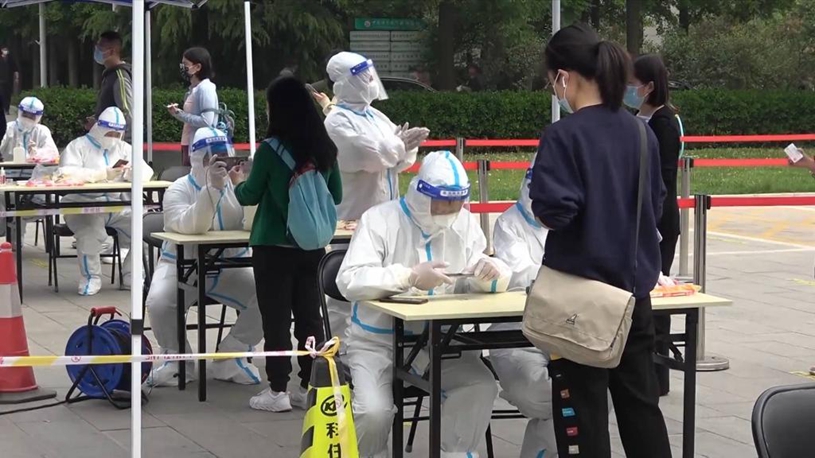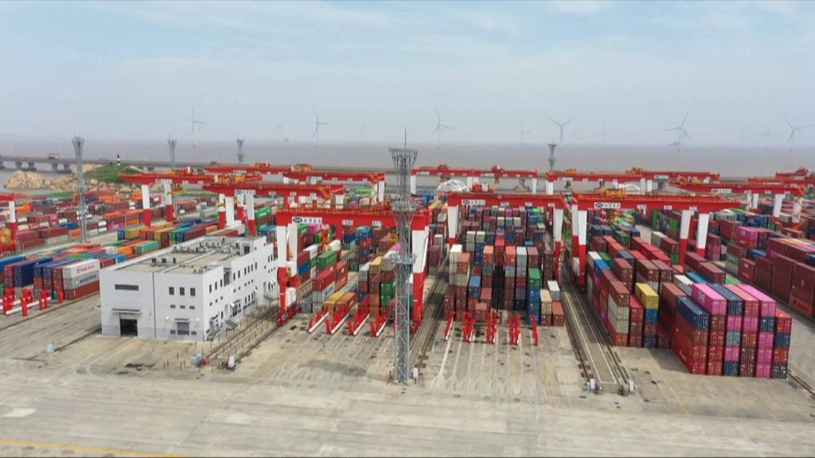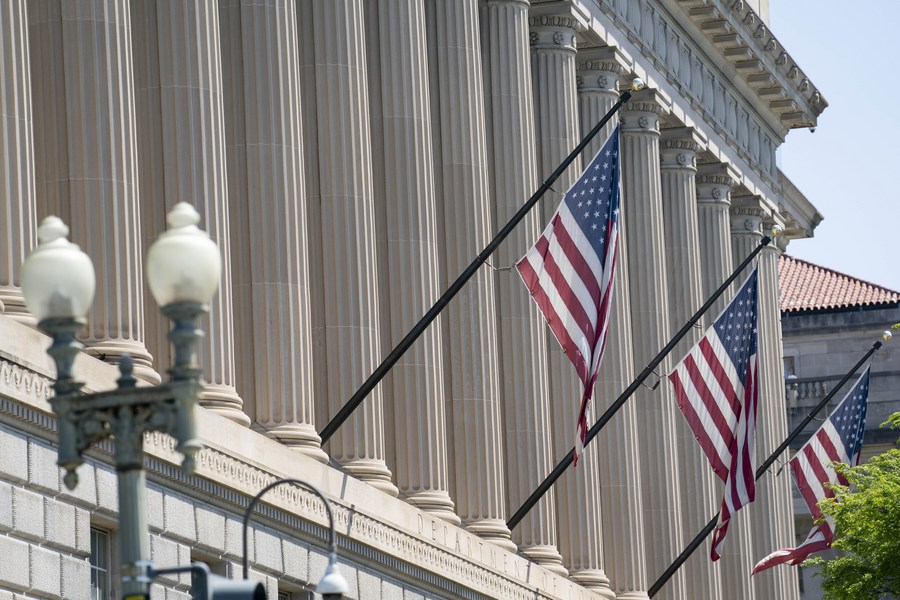
Photo taken on April 28, 2022 shows the Commerce Department building in Washington, D.C., the United States. (Xinhua/Liu Jie)
The U.S.-China Business Council said that there is no reason to maintain the additional tariffs on Chinese products imposed during Donald Trump's presidency and eliminating them will lower prices for many consumer goods amid high inflation.
WASHINGTON, April 29 (Xinhua) -- The U.S.-China Business Council (USCBC) urged President Joe Biden's administration to ease tariffs on Chinese goods as the U.S. economy registered a quarterly decline of 1.4 percent, fueling concerns about a future recession amid sustained inflation pressures.
"NO REASON TO MAINTAIN" TRUMP'S TARIFFS
The USCBC said on Wednesday that there is no reason to maintain the additional tariffs on Chinese products imposed during Donald Trump's presidency and eliminating them will lower prices for many consumer goods amid high inflation.
"We are pleased that the Biden administration is considering reducing or eliminating some tariffs on imported goods from China," the trade group, which represents 260 American companies that do business with China, said in a statement sent to Xinhua.
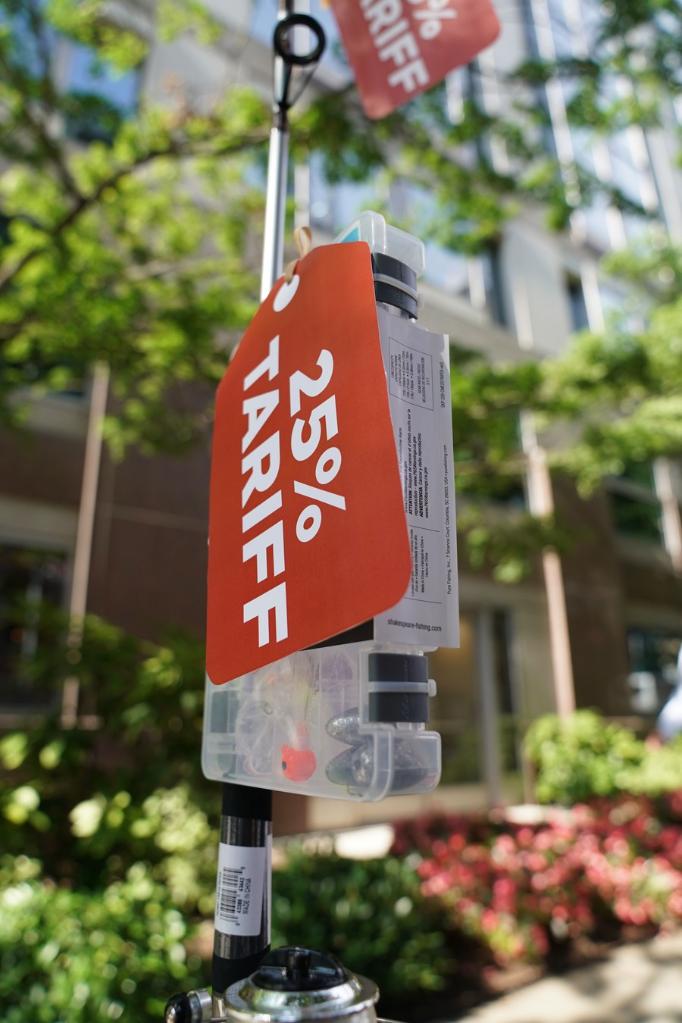
Photo taken on June 17, 2019 shows anti-tariff posters on a fishing rod in Washington D.C., the United States. (Xinhua/Liu Jie)
The comment came after Deputy National Security Adviser Daleep Singh and Treasury Secretary Janet Yellen spoke about potential easing of tariffs on Chinese goods.
Singh said at an event last Thursday that tariffs imposed by the Trump administration served no strategic purpose and the Biden administration could lower tariffs on non-strategic Chinese goods such as bicycles or apparel to help curb inflation.
Following his remarks, Yellen said last Friday in an interview with Bloomberg Television that the administration is re-examining carefully its trade strategy with respect to China, and removing tariffs is "worth considering" as the government seeks to combat inflation.
"Our members have opposed the tariffs since they were introduced during the Trump administration," the USCBC said. "We pointed out that the tariffs were an unnecessary tax on U.S. consumers and businesses for no good policy purpose."
The trade group noted that eliminating the tariffs now will lower prices for many consumer goods, "saving households hundreds of dollars per year during a period of high inflation."
The March consumer price index (CPI) surged 8.5 percent from a year earlier, the largest 12-month increase since the period ending December 1981, according to data from the U.S. Labor Department. That compared with a 7.9-percent year-on-year gain in February.
"With many members of Congress opposed to maintaining the tariffs, there's no reason to maintain them," the USCBC said.
"Once gone, it may be possible to engage China's leaders in a new round of negotiations to resolve other trade disputes," it added.
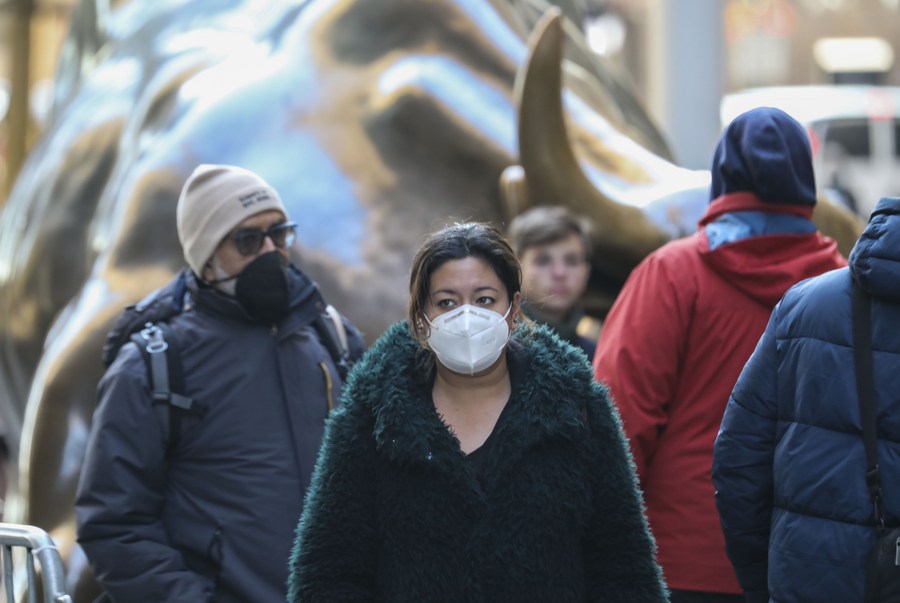
A woman wearing a face mask walks on a street in Manhattan of New York, the United States, Jan. 19, 2022. (Xinhua/Wang Ying)
LOOMING RECESSION
The U.S. Commerce Department reported Thursday that the country's economy shrank at an annual rate of 1.4 percent in the first quarter this year amid the Omicron surge and elevated inflation, raising the fear of a looming recession.
The latest data marks the economy's first contraction since the COVID-19 pandemic forced the economy to contract sharply in early 2020.
"We're gonna have a recession. Nothing is certain in economic life, but that's pretty certain," Gary Hufbauer, a former U.S. Treasury official and nonresident senior fellow at the Peterson Institute for International Economics, told Xinhua.
Hufbauer noted that there's no historical experience that suggests with such high inflation, the Federal Reserve is able to bring inflation down to its 2-percent goal without a recession.
Since the March policy meeting, a flurry of comments from U.S. Federal Reserve officials indicated that the urgency for rate hikes is growing, and the central bank is prepared to take more aggressive actions going forward.
Desmond Lachman, senior fellow at the American Enterprise Institute and a former official at the International Monetary Fund (IMF), also highlighted the possibility of an economic recession, arguing that another reason for pessimism has been the recent inversion in the yield curve.
"The 2-year government bond yield has unusually exceeded the 10-year bond yield. In the past, such bond yield inversions have very accurately forecast the onset of a recession within six to twenty-four months," Lachman told Xinhua.
"Perhaps even more troubling is the likelihood that Fed policy tightening could burst our current equity and housing market bubbles," Lachman added. ■
